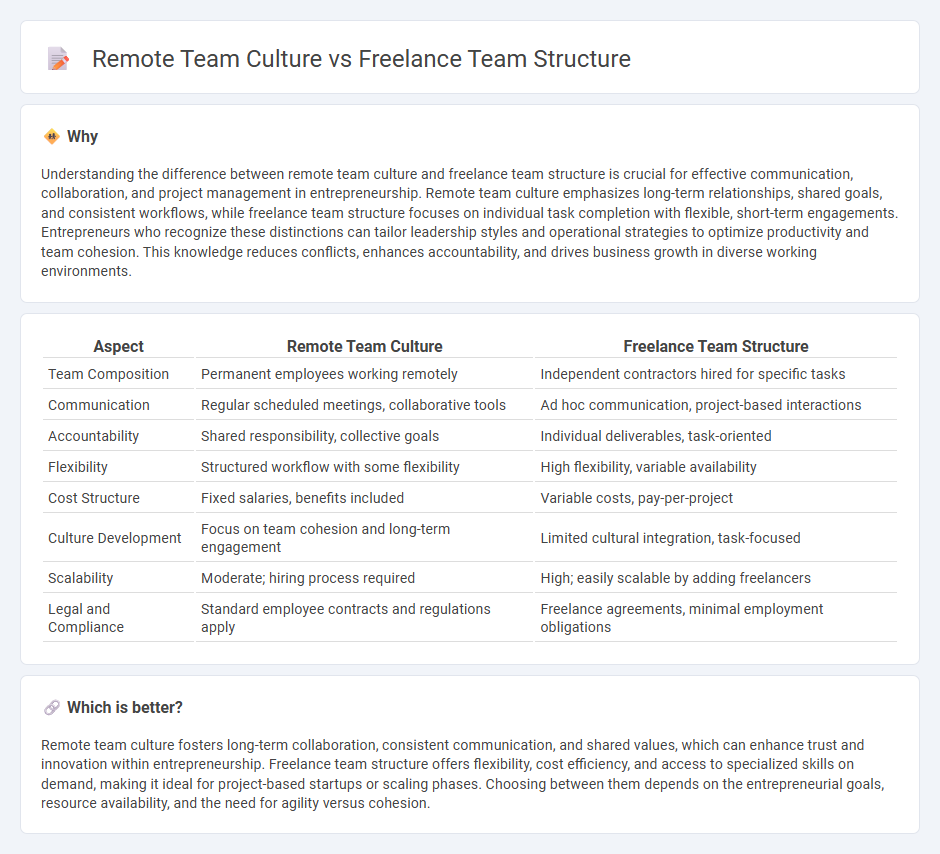
Entrepreneurship thrives on effective team dynamics, with remote team culture emphasizing long-term collaboration, consistent communication, and shared company values to drive innovation and growth. In contrast, freelance team structures offer flexibility and specialized skills on a project-by-project basis, often prioritizing task completion over sustained cohesion. Explore how choosing the right team framework can enhance entrepreneurial success and operational efficiency.
Why it is important
Understanding the difference between remote team culture and freelance team structure is crucial for effective communication, collaboration, and project management in entrepreneurship. Remote team culture emphasizes long-term relationships, shared goals, and consistent workflows, while freelance team structure focuses on individual task completion with flexible, short-term engagements. Entrepreneurs who recognize these distinctions can tailor leadership styles and operational strategies to optimize productivity and team cohesion. This knowledge reduces conflicts, enhances accountability, and drives business growth in diverse working environments.
Comparison Table
| Aspect | Remote Team Culture | Freelance Team Structure |
|---|---|---|
| Team Composition | Permanent employees working remotely | Independent contractors hired for specific tasks |
| Communication | Regular scheduled meetings, collaborative tools | Ad hoc communication, project-based interactions |
| Accountability | Shared responsibility, collective goals | Individual deliverables, task-oriented |
| Flexibility | Structured workflow with some flexibility | High flexibility, variable availability |
| Cost Structure | Fixed salaries, benefits included | Variable costs, pay-per-project |
| Culture Development | Focus on team cohesion and long-term engagement | Limited cultural integration, task-focused |
| Scalability | Moderate; hiring process required | High; easily scalable by adding freelancers |
| Legal and Compliance | Standard employee contracts and regulations apply | Freelance agreements, minimal employment obligations |
Which is better?
Remote team culture fosters long-term collaboration, consistent communication, and shared values, which can enhance trust and innovation within entrepreneurship. Freelance team structure offers flexibility, cost efficiency, and access to specialized skills on demand, making it ideal for project-based startups or scaling phases. Choosing between them depends on the entrepreneurial goals, resource availability, and the need for agility versus cohesion.
Connection
Remote team culture fosters flexibility, autonomy, and effective communication, essential elements for a successful freelance team structure in entrepreneurship. Freelance teams thrive within a remote culture that emphasizes trust, collaboration tools, and clear expectations to enhance productivity and innovation. Entrepreneurs leveraging this connection optimize resource allocation, reduce overhead costs, and access diverse talent pools across global markets.
Key Terms
Autonomy
Freelance team structures emphasize individual autonomy, allowing professionals to manage their workloads independently while contributing specialized skills to distinct projects. Remote team cultures foster autonomy through collaborative tools and communication frameworks that support self-management alongside shared accountability. Explore how autonomy shapes the dynamics and performance in both freelance and remote team models.
Communication
Freelance team structures often rely on project-based communication tools and clear, defined roles to ensure task completion and deadline adherence, emphasizing efficiency and deliverables. Remote team culture fosters continuous, transparent communication through regular meetings, collaborative platforms, and informal check-ins to build trust, cohesion, and engagement across diverse locations. Explore strategies to enhance communication dynamics in both freelance and remote teams for optimized performance and teamwork.
Collaboration
Freelance team structures typically emphasize individual accountability with specialized roles, promoting flexible collaboration through project-based interactions. Remote team culture fosters continuous communication and shared goals, leveraging digital tools to maintain strong interpersonal connections and collective problem-solving. Explore effective strategies to enhance collaboration in both freelance and remote team environments.
Source and External Links
How To Grow a Freelance Team in 6 Steps (With Tips) - Indeed - To structure a freelance team, start by determining project needs, then search and hire the right freelancers, and finally define clear roles and responsibilities within the team to align efforts with project goals.
How to manage multiple freelancers to achieve great synergy - Blog - A freelance team structure should establish clear roles with responsibilities, decide on cross-functional versus monoline teams, delegate a main manager, and break projects into scoped individual tasks to create synergy and streamline management.
From Freelancing to Growing your Team - Spruce Rd. - Freelance team structures can vary, including hiring subcontractors focused on client work, engaging project managers, working with specialized roles like copywriters and assistants, and developing collaborations across designers, developers, and other creatives.
 dowidth.com
dowidth.com